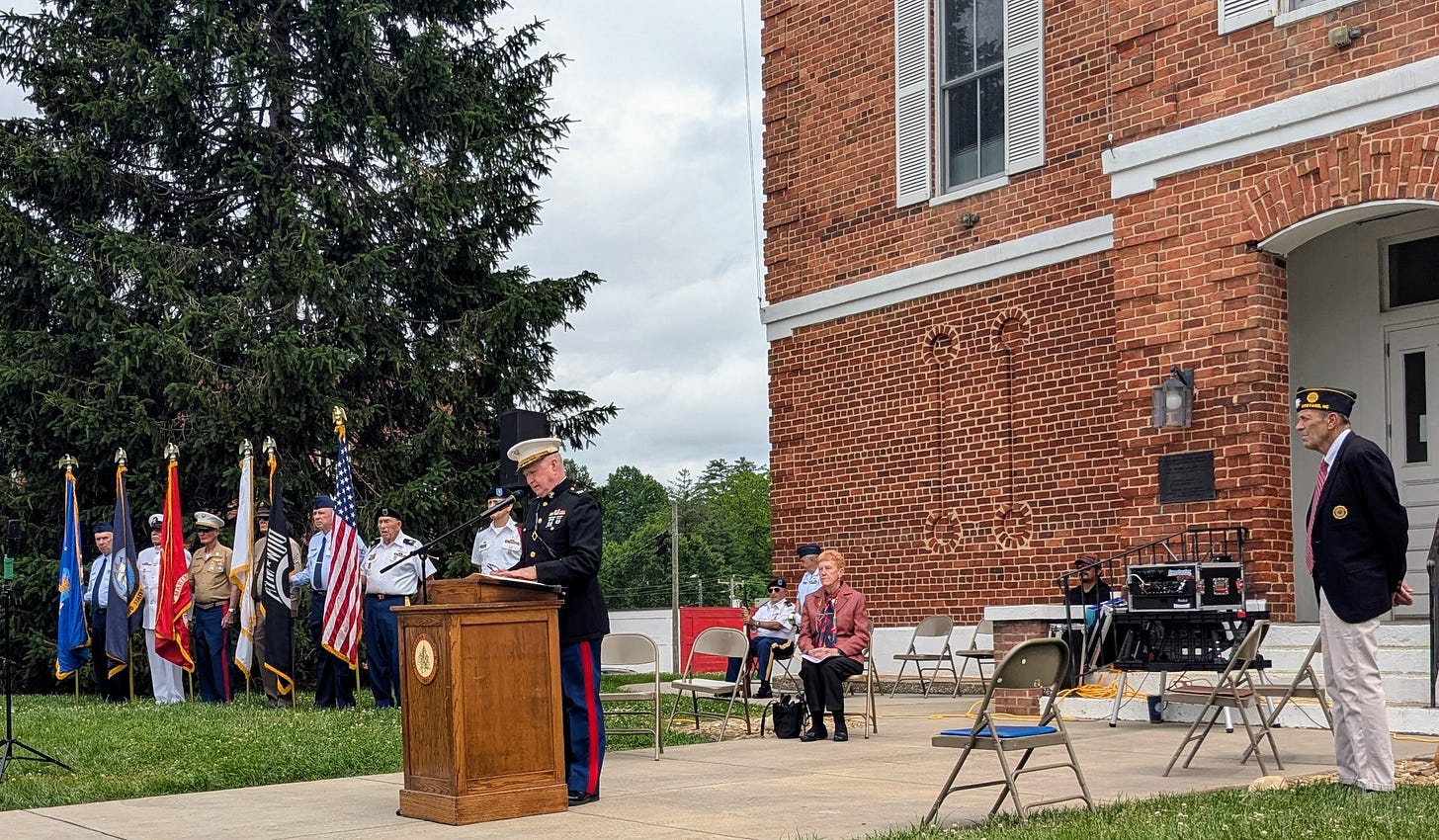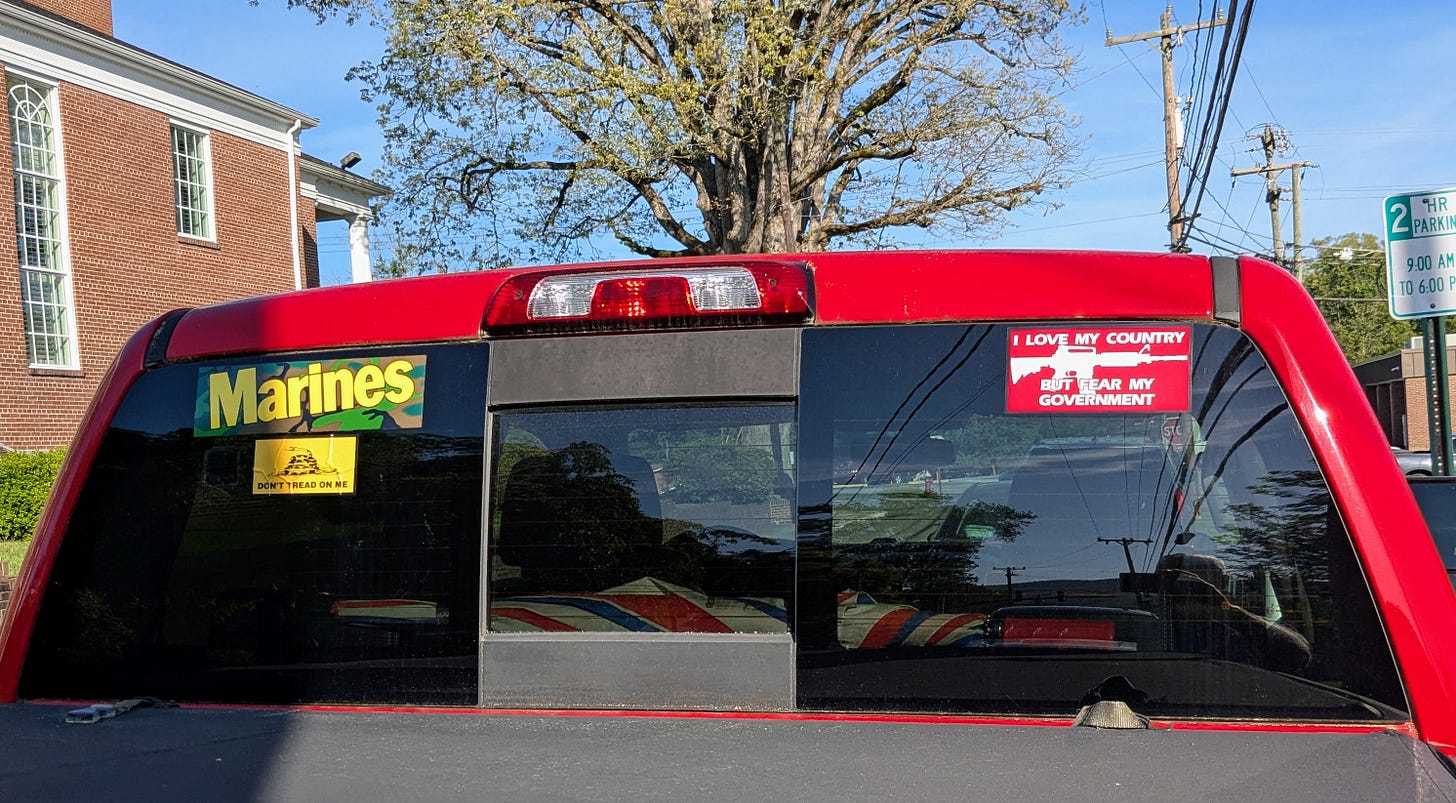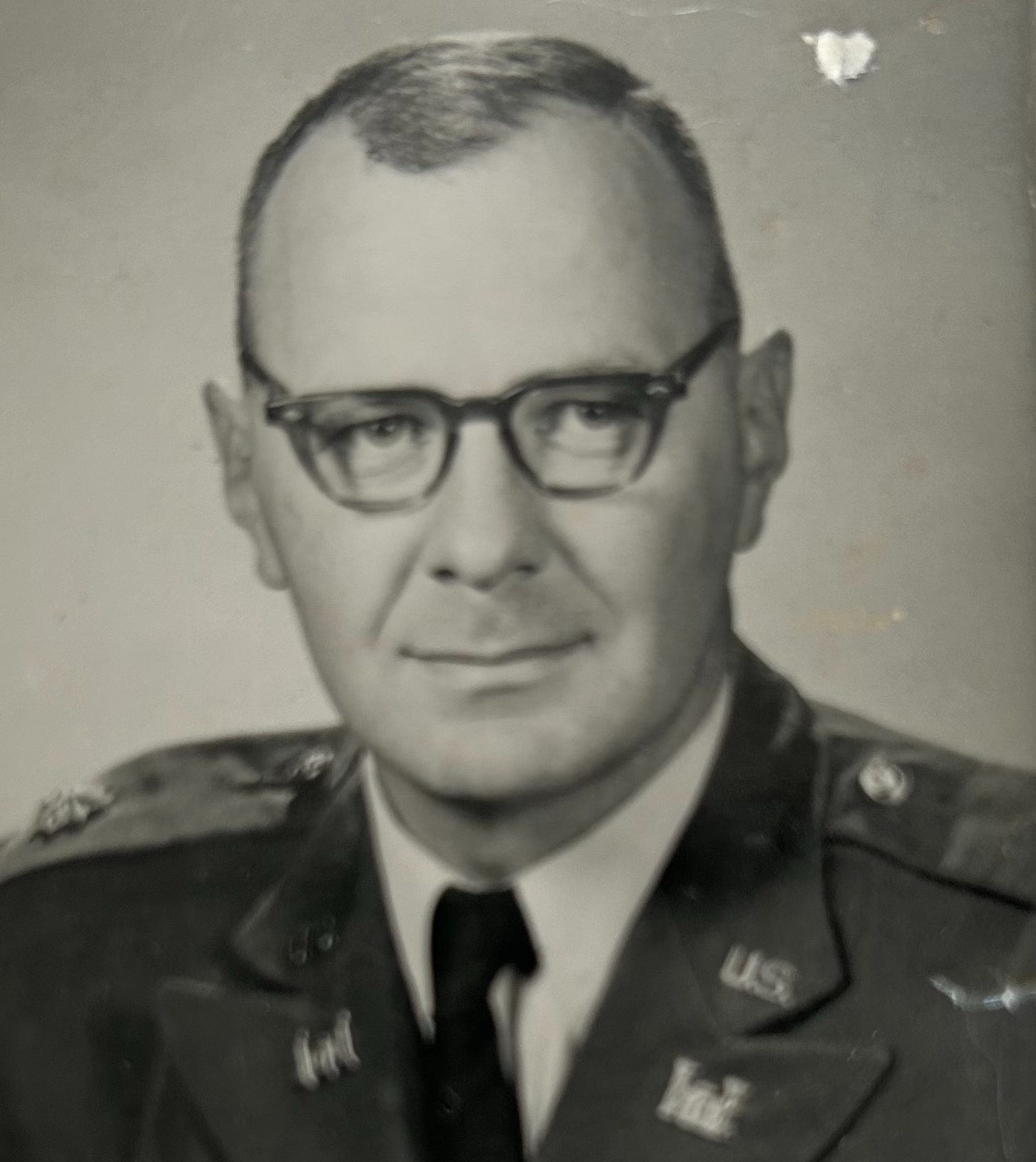Opinion: Larry Chapman and Blurred Line between Patriotism and Militarism
Let's honor soldiers and sailors, especially, of course, the ones who died in battle, while being aware that exalting their service above others' can lead to undemocratic and tragic results.

BREVARD — The always-moving Gettysburg Address stirred up a new emotion when I listened to County Commissioner Larry Chapman read it at the Memorial Day ceremony in downtown Brevard.
A slow-burning resentment, a feeling that this guy’s got a lot of nerve.
The Address, as you no doubt know, is a distillation of the nation’s highest ideals written by a leader who embodied them.
It was read by Chapman, a high-profile supporter of a president who embraces (literally, at least in one case) the symbols of those ideals while undermining just about every one of them.
Abraham Lincoln wrote from the perspective of someone confronted daily by the hideous consequences of war, including the carnage on the grounds where he spoke.
Chapman, who served as an active-duty officer in the US Marine Corps and retired as colonel in the Reserve, has built a political persona as a sort of second coming of Gen. George Patton without ever having seen a battlefield.
(He was ready to fight during the first Gulf War, he wrote when I asked him for an election story, but never got closer to the action than Europe.)
Gettysburg was all about unity, the one goal worth the price of the Civil War’s tragedy — keeping a uniquely great country whole.
Chapman is open to the idea of breaking it up.
Not surprising for a politician who loves his Marine Corps shirts and hats and whose standard email sign-off is the Corps’ motto, “semper fidelis,” his red Chevrolet pickup truck is outfitted with the branch’s insignia and a Marine decal on one side of the rear window of its cab.
On the other side is a red-and-white sticker with the outline of an assault rifle and the words, “I love my country, but fear my government.”
Wondering how he could possibly square those two messages, I asked him during a brief exchange after the ceremony: Does that mean he thinks people have the right to revolt?
“Yes,” he said. “If things get bad they do. That’s why we have this country.”
Yeah, but his uprising would not be against a monarchy but the very democracy that the Address urges us to cherish. And don’t all Marines take an oath to uphold the Constitution and “obey the orders of the President of the United States?” Yes, they do.
He snubbed my offer to talk more about these subjects, which probably would have led to my preferred method of writing polite, nuanced columns, such as the one based on my interview with his Trump-supporting former boss at the Ecusta Mill.
That’s okay, because based on what I see of his views of the military and the prevailing views of conservatives, I don’t think we could have found much common ground.
Their patriotism looks to me like nationalism, their respect for service like militarism.
Recently it’s been fueled by Trumpism, the bullying approach of a draft dodger with a record of insulting military heroes and Gold Star families, pardoning war criminals and firing esteemed generals who is now planning a grossly expensive, self-glorifying military parade.
This has been layered over the every-veteran-a-hero narrative we’ve been bombarded with since 9/11.
A few examples: the time reserved at every School Board meeting to honor former students who served, the discounts and choice parking spaces Lowe’s offers to veterans, the speakers at Monday’s ceremony who repeatedly said it is members of the military, above all, whom we must thank for our “democracy” and “freedom.”
Which is true in the general sense. A strong military protects our interests and, to the extent that they are still intact, our founding principles.
But it’s not always true and in the cases where it’s not, it’s at least partly because of the anti-democratic force of this dogma. To question it is to be branded a heretic. Pro-war voices are elevated and questioning ones squelched, which makes us susceptible to disasters like the early 2000s invasions of Iraq and Afghanistan.
Tell me, who better represented the cause of liberty, the architects of those actions or the supposedly unpatriotic folks who said they might not be a good idea?
And what did more for democracy, the military that carried these fights, or our system of free, universal, public education, with its vast expansion of opportunity and literacy, its mixing of students of all races and backgrounds, its history and civics classes promoting responsible citizenship?
So, how about we list the former students who went on to become public school teachers or shower them with discounts?
Or maybe, considering that every patriotic holiday has basically been recast as a veterans day, we could briefly pause during one of them to think about all the other people in our country who work to promote equality and liberty for modest compensation.
Of course, that doesn’t mean we shouldn’t respect military service or that we should blame veterans for serving in wars they didn’t start.
We shouldn’t fail to recognize an essential difference between other folks in public service and soldiers, who sign up with the knowledge that the possibility of death or lifelong disability comes with the job, whether or not they ultimately enter combat.
It was something I was reminded of every day growing up in an Army family.
A grandfather who was a veteran of both World Wars, an uncle who was a legit World War II hero and, later, a brigadier general in the US Army Reserve.
Parents who enlisted in World War II and returned to serve as officers in the Korean War. A father who made a career of it despite losing most of the use of his left hand after being shot in Korea.
And since Chapman explained that he wanted to fight, I can say that I saw it as my duty to serve. I was all set to enroll in the Marine Corps’ Officer Candidate School until a final interview revealed that the Corps had a zero-tolerance drug policy and, at the time, I didn’t.
What put me on this path? What did I learn about service from Lt. Col. Sandy DeWitt, a thoughtful, somewhat melancholy man whose somber reading of the names of the residents of our village killed in combat was the emotional anchor of its annual Memorial Day tribute?
The authentic glory of our nation’s role in defeating Nazi Germany balanced by the shame of Vietnam, which he knew was doomed to be a fiasco, he said, from his time there as military advisor in the early 1960s.
He recognized the awesome destructive power of war and considered it a last resort, justifiable only by clear and compelling arguments such as the Gettysburg Address. Veterans should be honored and flag-waving politicians seen with skepticism.
The military, in other words, needs the guardrails formed by robust public debate, a healthy dose of questioning. Anything else is undemocratic.
Email: brevardnewsbeat@gmail.com






Thank you Dan. I had the same thoughts as I listened to 2 hypocrites at the Memorial Day ceremony. Ted Budd’s message was the complete opposite of his political stance as a MAGA senator representing NC. I know you’ll get lots of hate mail…keep in mind there are more of us who agree with you. Larry Chapman’s arrogance knows no bounds.
This column is a fantastic perspective on Memorial Day, our veterans, and the many meanings of "service to our country." Personally, I'm especially grateful that you thought of mentioning schoolteachers. We've long been under-paid and under-appreciated, but these recent years of anti-educator critiques and blustering insistence that truth and questioning are anti-American have been nothing short of bludgeoning. Educators deserve huge appreciation for persisting in their love for the pursuit of learning and for their students.